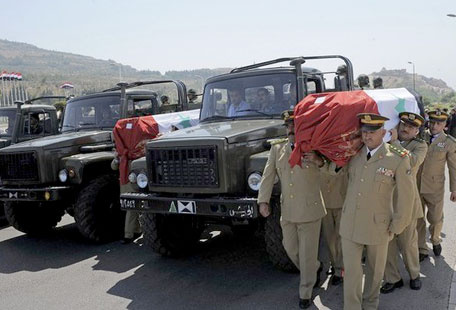Lethal Blow to the Smooth Trend of Negotiations

The following points should be considered in this regard:
1. Bashar Assad, Syria's president, immediately appointed his new defense minister in order to raise the spirits of his supporters. He has to take controlling and possibly violent measures to maintain the stability of the capital. It seems that, following the explosion, crisis and military confrontations and consequently violence and killings will grow.
2. All efforts made by the military commanders were aimed at maintaining Damascus’ red line and preventing opposition forces from entering the capital. But with this explosion, the crisis has entered this city and the ability of security forces to control sensitive centers of the capital has seriously been challenged.
3. This incident indicates the infiltration of opposition forces in the heart of the high military command of this country. This is certainly a great achievement for the opposition, particularly for the Free Syrian Army (FSA), whose command center is in Turkey. This measure showed that security gaps do exist within the Syrian army, and it was also a sign of the organization and boldness of the opposition forces.
4. Once again, the explosion of the security center in Damascus showed that Bashar Assad and the ruling regime in Syria are faced with problems inside the country and the opposition has been able to infiltrate deep inside the security meetings. This is an alarm for the survival of the regime, one which could be heard since months ago. The Wednesday morning explosion of Syria's security center brings to mind one similar clash in 1982, when the headquarters of the Baath Party, the Air Force command center in Damascus, and several other important security centers, were subjected to suicide operations, which led to numerous deaths, during the Hafez Assad regime. At that time, the Syrian government had bloody clashes only with the radical faction of the Muslim Brotherhood, which ultimately led to the siege of the city of Hama by military forces and vast suppression, which was unprecedented in the country’s history. Of course, at that time, the Muslim Brotherhood was the only opposition movement which was supported and equipped by Iraq's Baath government under the command of Saddam Hussein. Today, the situation is certainly and completely different and various factions of dissidents have stood against Bashar Assad. Besides, political and logistic support, whether soft or hard, from the western front, under the leadership of the US and the active regional role of Saudi Arabia, Qatar, and Turkey, is very obvious. As a result, expansion of the areas of confrontation and the increasing number of deaths of military and security forces of the government are indicative of two issues:
A. Opposition forces enjoy better training and better equipment compared to the beginning of confrontations.
B. These measures indicate that the Kofi Annan plan will not succeed in the atmosphere of such clashes in Syria and creating an atmosphere for a political plan will be full of ambiguity. After this incident, the possibility of reaching a solution of dialogue and negotiations between the two sides has not only been lost, but it is also pushing the country towards civil war.

